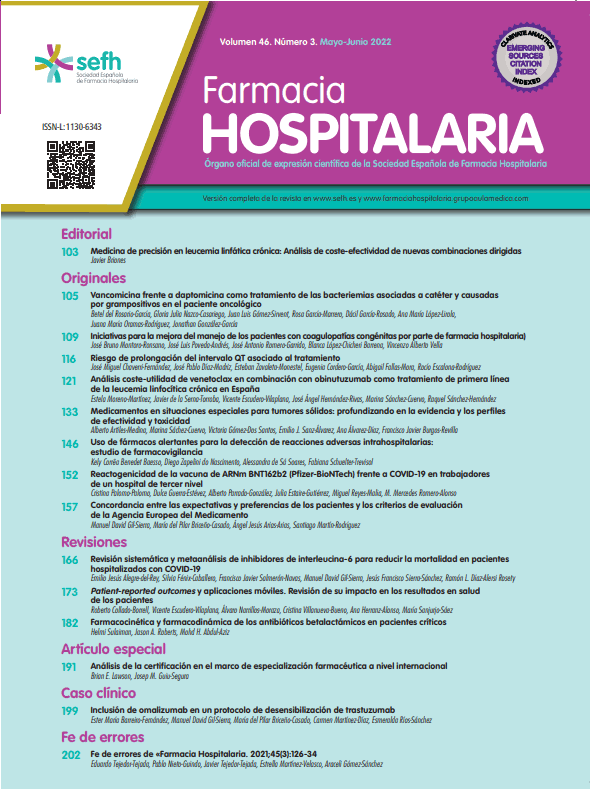Since the publication of the MOSAIC test results in 2004, the FOLFOX4 regimen has been established as an adjuvant treatment which is recommended in stage III colorectal cancer. The aim of this study is to assess the use of this regimen in our field and to describe its toxicity.
MethodsDescriptive study of treatments with FOLFOX4 prescribed between April 2005 and March 2007. The data was obtained from the Farhos Oncología® programme and clinical records. The following data was collected: age, gender, diagnosis, stage of the illness (TNM classification), and adverse reactions, expressing severity according to Common Toxicity Criteria 2.0.
ResultsThe FOLFOX4 regimen was prescribed for 39 patients (24 men and 15 women) with an average age of 59. The diagnoses were: 28 colon cancer (4 stage II, 17 stage III, and 7 stage IV), 10 rectal cancer (1 stage II, 4 stage III, and 5 stage IV), and 1 stage IV gastric cancer. The most frequent adverse reactions were peripheral neuropathy (82%), neutropaenia (56.4%), and diarrhoea (53.9%). When the study was completed, 9 patients continued active treatment with the regimen (average, 6.8 cycles). Of the 30 remaining patients only 16 people completed the 12 planned cycles. Forteen patients stopped their treatment (average, 8.1 cycles) due to toxicity in 10 cases, clinical progression in 3 cases, and 1 patient died. Of the total 368 cycles administered, 68 suffered administration delays and 22 had the dosage reduced.
ConclusionThe use of the FOLFOX4 regimen has been adjusted to uses with some solid scientific evidence, but its toxicity has limited its use and has made administering the planned dosage levels difficult.
Desde la publicación de los resultados del estudio MOSAIC en 2004, el esquema FOLFOX4 se ha establecido como un tratamiento adyuvante recomendado en los cánceres colorrectales estadio III. El objetivo de este estudio es valorar la utilización de este esquema en nuestro ámbito y describir su toxicidad.
MétodosEstudio descriptivo de los tratamientos con FOLFOX4 prescritos desde abril de 2005 a marzo de 2007. Los datos se obtuvieron del programa Farhos Oncología® y las historias clínicas. Se recogieron las variables siguientes: edad, sexo, diagnóstico, estadio de la enfermedad (clasificación TNM) y reacciones adversas, expresando su gravedad según los Common Toxicity Criteria 2.0.
ResultadosEl esquema FOLFOX4 ha sido prescrito a 39 pacientes (24 varones y 15 mujeres), con una mediana de edad de 59 años. Los diagnósticos fueron: 28 cáncer de colon (4 estadio II, 17 III y 7 IV), 10 cáncer de recto (1 estadio II, 4 III y 5 IV) y 1 cáncer gástrico estadio IV. Las reacciones adversas más frecuentes fueron neuropatía periférica (82%), neutropaenia (56,4%) y diarrea (53,9%). Al finalizar el estudio 9 pacientes seguían en tratamiento activo con este esquema (media, 6,8 ciclos). De los 30 restantes, sólo 16 completaron los 12 ciclos previstos. En 14 pacientes se suspendió el tratamiento (media, 8,1 ciclos), siendo los motivos: toxicidad en 10 casos, progresión clínica en 3 y fallecimiento en 1. Del total de los 368 ciclos administrados, 68 tuvieron retrasos en la administración y en 22 se redujo la dosis.
ConclusiónLa utilización del esquema FOLFOX4 se ha ajustado a usos con unas evidencias científicas sólidas, pero su toxicidad ha limitado el uso y dificultado la administración de la intensidad de dosis prevista.
The preliminary results of this study were presented in the 51st National Congress of the SEFH (Spanish Society of Hospital Pharmacists), held in Málaga on September 26 to 29, 2006.






